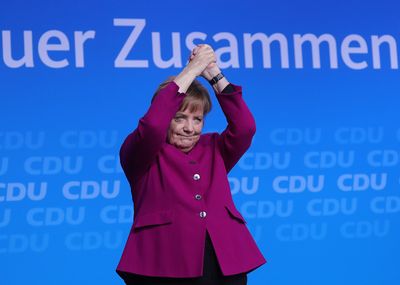
Photographer: Krisztian Bocsi/Bloomberg
Angela Merkel’s first foray into politics after the fall of the Berlin Wall was as spokeswoman for an East German party called Democratic Awakening.
Months of Turmoil
Nobody close to the center of power was calling for her resignation and Merkel has demonstrated repeatedly she can bounce back from crises that appeared to signal her undoing.
Still, the unexpected defeat adds to an extended period of political turmoil in a nation that’s more used to being a byword for stability. The year that’s passed since an inconclusive election has seen months of fraught negotiations to form a coalition government, then a revolt by her Bavarian allies in June followed by weeks of infighting over the fate of Germany’s domestic intelligence chief. All reflect an increasing polarization of politics epitomized by the fallout of migration that has haunted Merkel since she refused to shut Germany’s borders in 2015.
“This is a democratic moment, in which there are also defeats,” Merkel told reporters after Brinkhaus’s victory. “There’s nothing to sugarcoat.”
Euro Area
The loss of her loyalist Kauder disrupts Merkel’s ability to control legislation, which has been central to pushing through divisive measures such as bailouts and financial backstops for the euro area.
Cooperation with the Social Democrats, who have consistently backed French President Emmanuel Macron’s proposals for the euro area against skeptics in Merkel’s Christian Democratic-led bloc, is also likely to become more difficult with a more independent-minded caucus. Christian Lindner, head of the opposition Free Democrats, said Merkel should call a confidence vote.
“Merkel has lost a central wheel in her machinery of power,” Ulrich Sarcinelli, a political scientist at the University of Koblenz-Landau.
Brinkhaus, a budget and finance expert who had never previously made a name as a public Merkel critic, led calls in April to put the brakes on euro-area reforms. He rallied lawmakers to force Merkel’s hand, insisting that the Bundestag have full say over lending by a future European Monetary Fund.
His election “reflects a desire for a more distinguishable center-right profile and a greater role for MPs after years of direct and ultra-pragmatic rule over the CDU from the chancellery,” said Carsten Nickel, an analyst at Teneo Intelligence in London.
AfD Celebrates
Merkel’s fourth-term government with the Social Democrats took office in March, six months after the federal election spurred months of political haggling. A year after the ballot, some polls suggest the anti-immigration Alternative for Germany party, or AfD, has overtaken the Social Democrats to become the country’s No. 2 political force.
The AfD, which won seats in the national parliament for the first time last year on an anti-Merkel platform, was jubilant.
“You can imagine the corks are popping here,” Alice Weidel, the party’s caucus co-leader, told reporters. “The Merkeldaemmerung has begun — the beginning of the end of Angela Merkel. We hope now that she exits more quickly.”
— With assistance by Birgit Jennen

